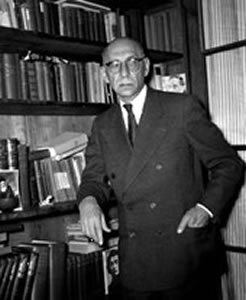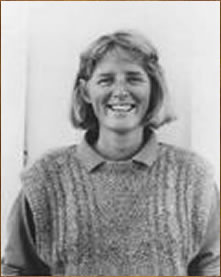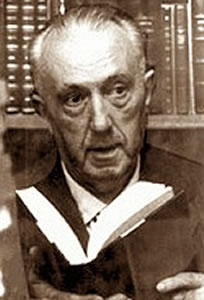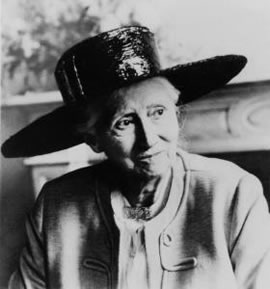De Poolse dichter en schrijver Antoni Słonimski werd geboren op 15 november 1895 in Warschau. Zie ook mijn blog van 15 november 2009.
Rebellion
Mein Herz zu rühren braucht es nur sehr wenig.
Mein Wort entlädt sich leicht wie ein Gewehr.
Im Königreich bin ich ein Revolutionär,
Und in der Republik lobpreise ich den König.
Elegy for the Little Jewish Towns
Gone now are, gone are in Poland the Jewish villages,
in Hrubieszow, Karczew, Brody, Falenica
you look in vain for candlelight in the windows
and listen for song from the wooden synagogue.
Disappeared are the last rests, the Jewish possessions,
the blood is covered over by sand, the traces removed,
and the walls whitewashed with lime,
as for a high holiday or after a contagious disease.
One moon shines here, cold, pale, alien,
already behind the town, on the road,
when night uncoils its light,
my Jewish relatives, boys with poetic feeling,
will no longer find Chagal’s two golden moons.
The moons now wander above another planet,
frightened away by grim silence, no trace of them.
Gone now are those little towns where the shoemaker was a poet,
The watchmaker a philosopher, the barber a troubadour.
Gone now are those little towns where the wind joined
Biblical songs with Polish tunes and Slavic rue,
Where old Jews in orchards in the shade of cherry trees
Lamented for the holy walls of Jerusalem.
Gone now are those little towns, though the poetic mists,
The moons, winds, ponds, and stars above them
Have recorded in the blood of centuries the tragic tales,
The histories of the two saddest nations on earth.
Vertaald door Howard Weiner

Antoni Słonimski (15 november 1895 – 4 juli 1976)
De Amerikaanse schrijfster Elizabeth Arthur werd geboren op 15 november 1953 in New York. Zie ook mijn blog van 15 november 2009.
Uit: Bring Deeps
„And in the air from all this smoke, there were two odors, coal and peat — two smells upon the chilly wind they blew in. As each fuel burned in hearths around the town, before dispersing in the sky, it heated well, I guessed, the house that it was burning in. But still, they were so different, coal and peat, you’d never think, to smell them, that they could be kin to one another. The smell of peat was lovely, sweet and rich, the smell of something that had once, perhaps, been lilies. These then had gone into the bogs, three thousand years before, created by the changing Orkney weather. The peat bogs had grown up where once there had been grass; and now, the great dark blocks of crumbling earthy peat, when set alight, still smelled of meadows.
The coal, though, smelled of fear. It was a bleak, depressing smell; it made it hard to feel much joy in any place where coal smoke blew around you. And you need not know anything of coal, and how it forged itself within the darkness of the earth a million years before, to feel this. You need not know how miners, even now, were sometimes killed, so far away from light and air, and chipping off black blocks of burning. The smell in any case was bleak; it smelled of places where you’d once been trapped, from which — against all odds — you’d managed to escape. It smelled of times that you would rather not remember, when the things you loved had been upended, loosed by someone’s hand and broken. And yet these two smells, intermixed in Kirkwall — now flowers, wafting on the air, and now the hard and hurting memories — came from two fuels which each had lain within the body of the earth in graves, one shallow and one deep, and which had each been then brought forth out of the deeps to give a bright bright gift of ease.“

Elizabeth Arthur (New York, 15 november 1953)
De Italiaanse schrijver Carlo Emilio Gadda werd geboren op 15 november 1893 in Milaan. Zie ook alle tags voor Carlo Emilio Gadda op dit blog.
Uit: Saint Georges chez les Brocchi (Vertaald door Marina Fratnik)
„Que Jole, la femme de chambre du comte, sortît chaque soir pour faire faire à Fuffi sa petite promenade: et que de temps à autre Fuffi, après avoir méticuleusement suivi, la laisse tendue et le museau contre terre, on ne sait quelle odeur, levât tout soudain contre le plus vénérable des marronniers d’Inde sa quatrième papatte comme pour dire: «Vrai de vrai, celui-là mérite qu’on l’arrose!»; qu’entre-temps des volées de bersagliers en retard rentrassent au pas de course, leurs plumes dressées dans le vent du printemps, et qu’ils débitassent à Jole des madrigaux à toute vapeur, avant que le rideau de fer de la retraite ne s’abatte brutalement sur les rêves errants de la nuit; que les trams galopassent à vide vers les hangars de banlieue, ou demi-vides, vers le grouillement des gares: et qu’une religieuse sur le départ baissât les yeux, joignant les mains sur son ventre, parce qu’elle avait entrevu par la fenêtre du tram des amants qui s’embrassaient à l’ombre des jardins obscurs; et que Jole, ayant aperçu la pauvre religieuse, laissât pénétrer dans ses veines un certain désarroi: que tout cela arrivât, c’était, pourrait-on risquer, tout à fait dans l’ordre des choses, du moins de celles de 1928 après J.-C.
Que par la suite Jole, pendant la petite promenade de Fuffi, qui tirait sur sa laisse et levait la patte à tout propos, se fît presque chaque soir aborder, oh la la!, par un «petit jeune homme», mais alors très très «jeune homme», de ceux qui n’ont rien de mieux à faire avec les filles que l’andouille: que parmi les événements de 1928 fût apparue cette complication, les yeux perçants, voire extralucides, des concierges de la belle-sœur du comte l’avaient peu à peu sinon constaté (à cause des marronniers d’Inde, des trams, des taxis, des innombrables ombres errant deux par deux sous les feuillages des uns et derrière les infatigables navettes des autres), du moins presque deviné. Puisque aussi bien, les soirs de printemps, les concierges prenaient le frais sous le porche: et que lui, fumait la pipe.

Carlo Emilio Gadda (15 november 1893 – 21 mei 1973)
De Amerikaanse dichteres Marianne Moore werd geboren op 15 november 1887 in Kirkwood, Missouri. Zie ook alle tags voor Marianne Moore op dit blog en ook mijn blog van 15 november 2009.
No Swan So Fine
“No water so still as the
dead fountains of Versailles.” No swan,
with swart blind look askance
and gondoliering legs, so fine
as the chinz china one with fawn-
brown eyes and toothed gold
collar on to show whose bird it was.
Lodged in the Louis Fifteenth
candelabrum-tree of cockscomb-
tinted buttons, dahlias,
sea-urchins, and everlastings,
it perches on the branching foam
of polished sculptured
flowers–at ease and tall. The king is dead.
To a Steam Roller
The illustration
is nothing to you without the application.
You lack half wit. You crush all the particles down
into close conformity, and then walk back and forth on them.
Sparkling chips of rock
are crushed down to the level of the parent block.
Were not ‘impersonal judment in aesthetic
matters, a metaphysical impossibility,’ you
might fairly achieve
it. As for butterflies, I can hardly conceive
of one’s attending upon you, but to question
the congruence of the complement is vain, if it exists.

Marianne Moore (15 november 1887 – 5 februari 1972)
